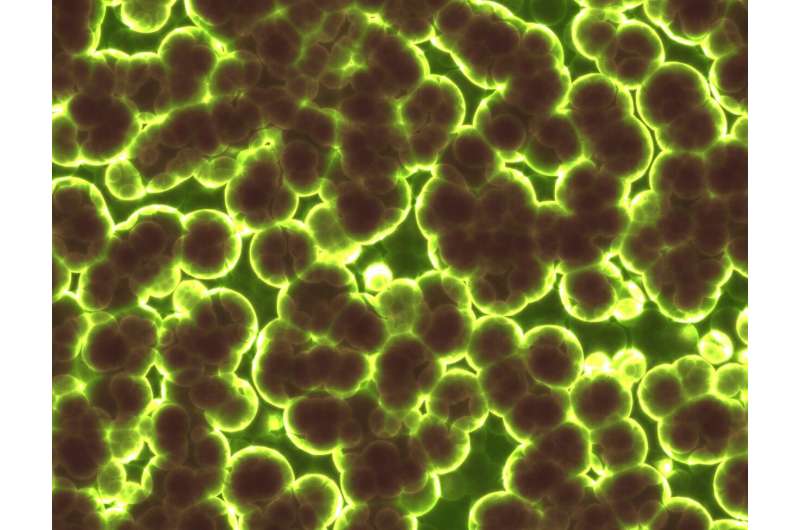Q&A: How synthetic biology will change us

John Cumbers is founder and CEO of SynBioBeta, a global network of biological engineers and entrepreneurs in a promising new scientific field known as "synthetic biology." The San Francisco Bay Area is a leader in this little-known but fast-growing industry, which reassembles the building blocks of life in imaginative and diverse ways.
SynBioBeta's conferences and webinars have featured leaders in both tech and the sciences, ranging from fomer Google CEO Eric Schmidt, venture capitalist Vinod Khosla, NIH Director Francis Collins and Stanford professor of bioengineering Drew Endy. This interview has been edited for length and clarity.
Q: Biology feels as natural as ladybugs, daisies and bunny rabbits. What makes it "synthetic"?
A: Every nucleotide, every A, C, T and G in every single one of your cells is synthesized. You were synthesized. Your DNA from your mom and dad is synthesized into 100 trillion cells—that's 100 trillion copies of your DNA—that makes you you. So, in that respect, "synthetic" is natural.
However, the name "synthetic biology" has come to mean a new set of technologies around reading, writing and editing of DNA, and designing, building and testing of biological cells to perform particular functions.
I describe "synthetic biology" as a movement to make biology easier to engineer.
Q: What does it do?
A: We're creating some cool innovations and applications, from food to fuel, drugs, materials, chemicals and consumer products.
For instance, Berkeley Lights is an Emeryville-based company that has built a piece of hardware to help discover potential drug-quality antibodies against the COVID-19 virus.
It allows you to take a sample of blood from a COVID-19-recovered patient, separate out the immune cells and put them into different "pens" on a machine they're called "nanopens"—with optical tweezers... You incubate them and have them make antibodies.
And then you can take those antibodies and test whether they are "neutralizing," that is, whether they kill, or neutralize, the coronavirus. If so, you can go back to the exact cell that made the right antibody that killed the virus. Then you can sequence the DNA of that immune cell.
You could send that sequence of DNA code to Twist Bioscience, based in San Francisco, and they'll build and send you back the actual DNA. You can put that DNA into another cell that's used specifically for making lots of antibodies.
Now you can brew those anti-COVID-19 antibodies in a fermenter. Just like you might brew beer or wine.
Q: Are there other interesting projects?
A: One is a San Francisco company called ZBiotics, which makes a probiotic hangover cure. They've changed a bacteria that lives in the gut so it expresses an enzyme which breaks down aldehyde, a byproduct of alcohol metabolism. Aldehyde causes your blood vessels to swell and get inflamed. That's what gives you a hangover.
Another really cool application comes from the company Checkerspot, based in Berkeley. They've created a gene "expression system" for producing oil from algae. They've launched their own ski brand—the skis are built of flexible foam made from the oils in algae.
Q: Besides skis and hangover cures, are there other compelling problems synthetic biology can help solve?
A: The climate crisis. Every time we pump oil from the ground, put it into a car and drive a mile, we are putting carbon out into the air. It's causing havoc.
Biology loves carbon. It sucks it out of the air; it eats it. And it converts it into skis, or hangover cures, or antibodies, or DNA. All of the stuff that I've mentioned is made of carbon. It's carbon biomanufacturing.
Q: How do you respond to people who say: "Don't mess with Mother Nature!"
A: Mother Nature is messing with us. She's a cruel mistress. Right now, there's coronavirus. And SARS, Ebola, lightning, floods, locusts, poisonous snakes, poisonous spiders... all of these horrible things are products of Mother Nature.
Q: Are there things we shouldn't do with biology? Are there lines we shouldn't cross?
A: I'm sure there are. I tend not to think about them. Oh, here's one: Biological warfare. We should never go there.
Q: What was the inspiration behind the creation of SynBioBeta?
A: I describe SynBioBeta as a synthetic biology startup self-help group. I founded it in 2012 as a way to bring together my friends in the startup and investor worlds to share best practices, meet each other and talk about what the future of biology looks like. Our first meeting had 150 people show up. About 12,000 to 13,000 people attended at the last conference.
We found that we found there's a niche of biologists who want biology to be easy to engineer and a bunch of engineers who want to engineer biology. That's the beautiful intersection. Our ability to program biology could drive the economy for the next century. And Silicon Valley is investing heavily in it.
©2020 The Mercury News (San Jose, Calif.)
Distributed by Tribune Content Agency, LLC.




















